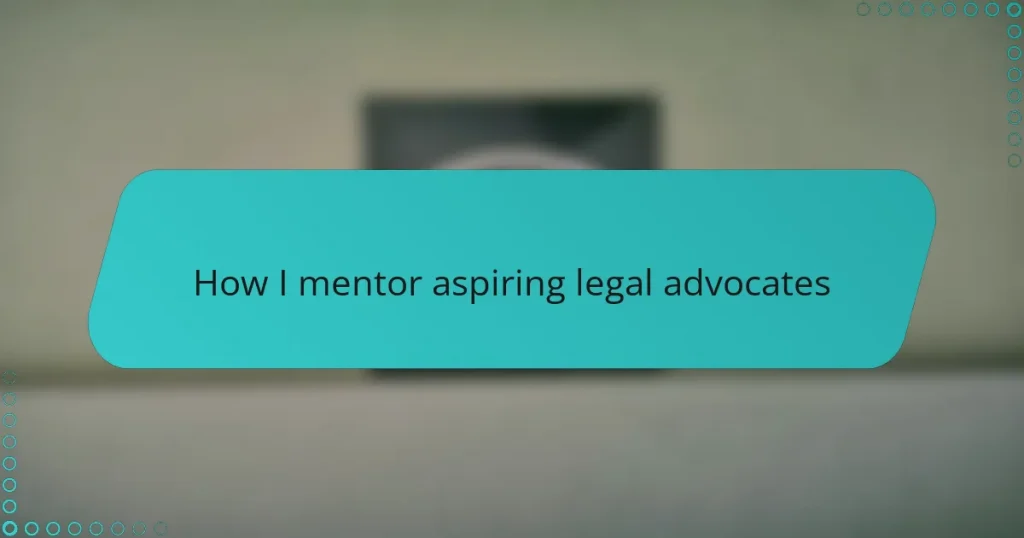Key takeaways
- Legal advocacy is rooted in empathy, understanding, and the courage to challenge injustices.
- Strong communication and analytical thinking are essential skills for effective advocacy, alongside resilience to navigate setbacks.
- Setting clear, personalized mentorship goals promotes growth and keeps motivation alive for both mentors and mentees.
- Real-world advocacy training emphasizes hands-on practice and adaptability, essential for building confidence and effective strategies.
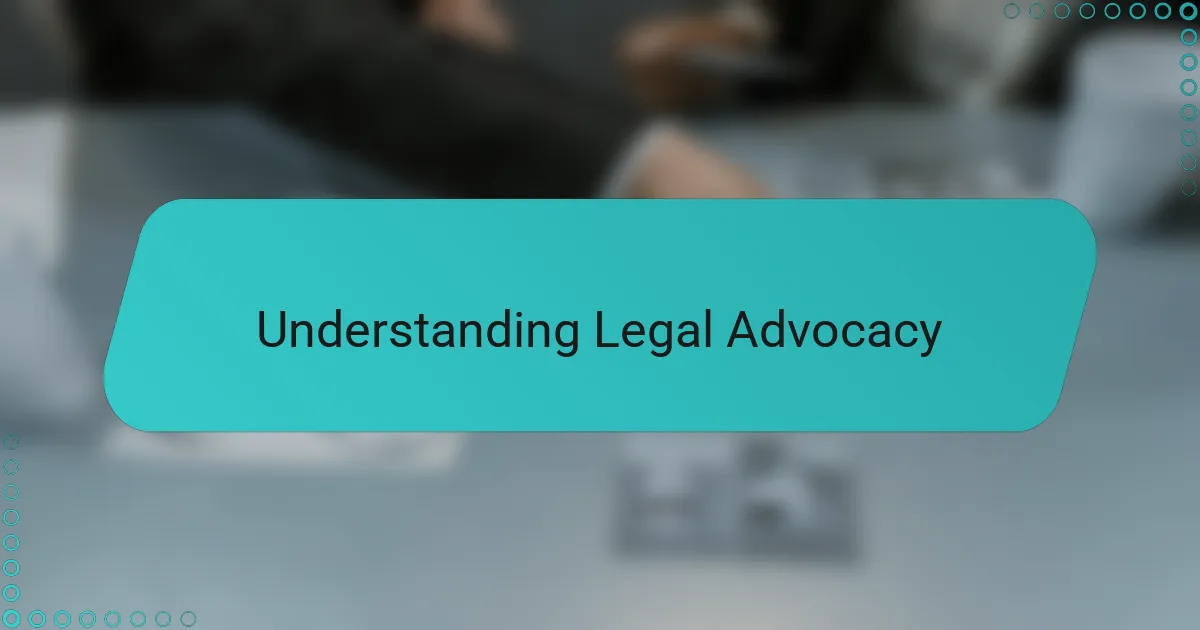
Understanding Legal Advocacy
Legal advocacy, to me, is more than just knowing the law; it’s about using that knowledge to stand up for those who can’t always stand for themselves. Have you ever witnessed how a single well-argued point can change someone’s fate? That moment, when understanding meets action, is where real advocacy begins.
I remember early in my career feeling overwhelmed by the complexity of laws, but what kept me going was realizing advocacy is deeply human. It’s about empathy and persistence as much as it is about statutes and codes. Don’t we all want to feel heard and defended when faced with injustice?
Understanding legal advocacy means embracing both its challenges and rewards. It requires courage to question the status quo and the heart to pursue justice relentlessly. I often ask myself: how can we teach aspiring advocates to balance these qualities without losing their passion?
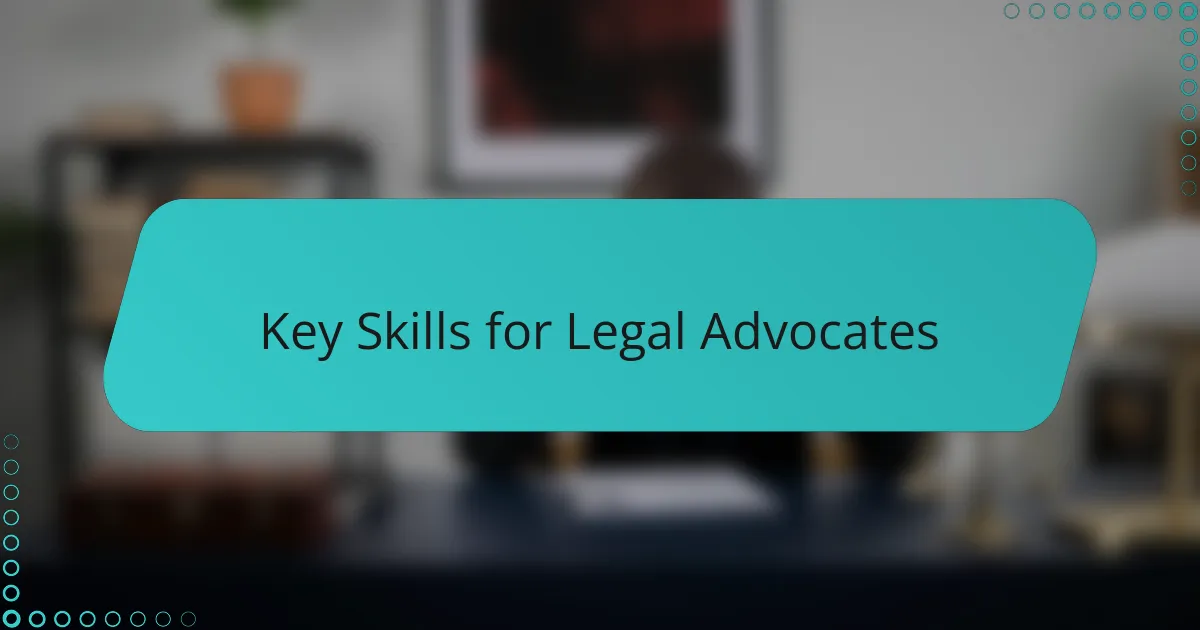
Key Skills for Legal Advocates
When I first started mentoring, I quickly saw that strong communication is the cornerstone of effective advocacy. It’s not just about speaking clearly in court, but also about listening deeply to clients’ stories. Have you noticed how the right question at the right moment can unlock crucial details others might miss?
Analytical thinking is another skill I emphasize. Sorting through complex legal issues requires patience and a sharp eye for detail. I often encourage mentees to approach problems as puzzles, asking themselves: what pieces are missing, and how does each fact fit into the bigger picture?
Finally, resilience stands out as a key trait. Legal advocacy is tough, filled with setbacks and long hours. I share with my mentees the times I felt discouraged and how pushing through those moments not only made me stronger but also more compassionate. Can you imagine giving up on a client just because the path wasn’t easy? That’s never an option in my book.
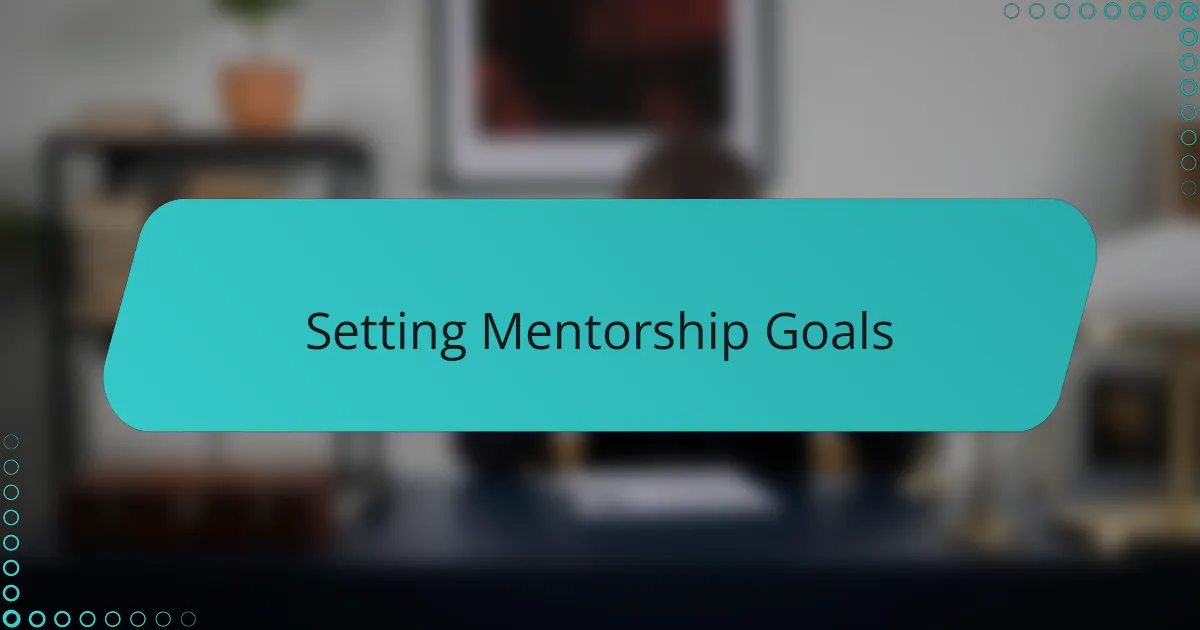
Setting Mentorship Goals
Setting clear mentorship goals is crucial to creating a meaningful and focused journey for both mentor and mentee. Early on, I learned that without defined objectives, sessions could drift, leaving good intentions unfulfilled. Have you ever started a conversation without knowing where you want it to lead? That aimlessness can sap energy and clarity.
I like to tailor goals to each mentee’s strengths and aspirations, whether it’s honing courtroom skills or developing client empathy. One memorable mentee once expressed a fear of public speaking; setting incremental goals helped transform that fear into confidence. Watching that progress reinforced how personalized targets keep motivation alive.
Setting goals also means being realistic about timelines and challenges. I often ask myself and my mentees: what can we achieve in six months versus a year? This keeps expectations grounded and progress measurable, so no one feels lost in the vastness of legal advocacy’s demands.
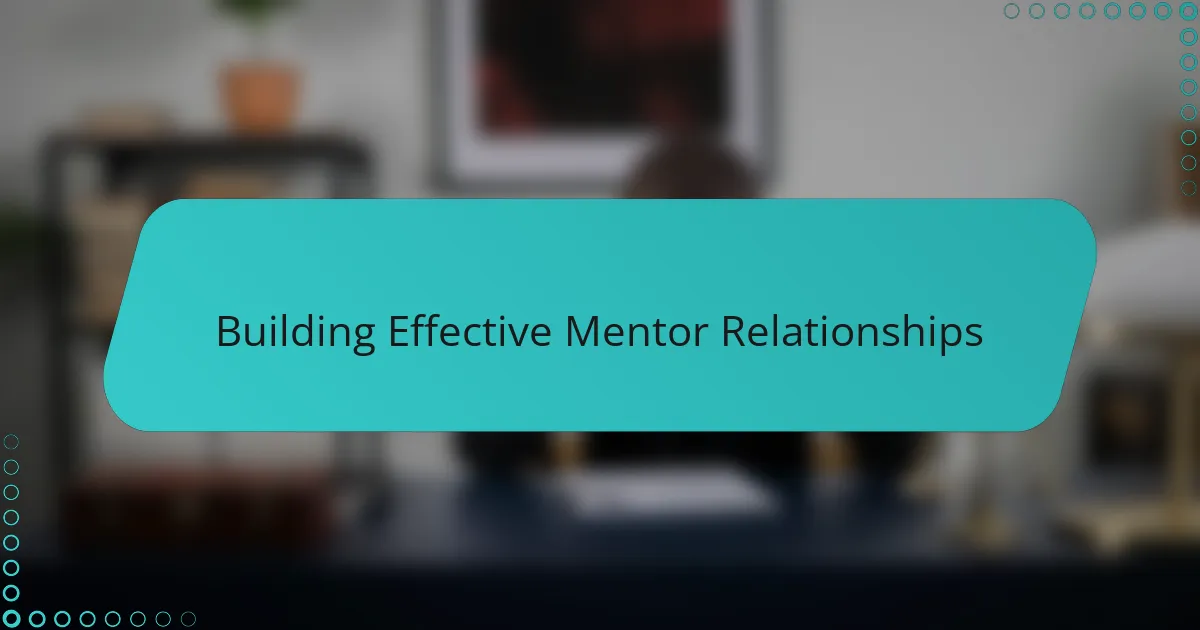
Building Effective Mentor Relationships
Building effective mentor relationships starts with trust, something I found essential early on. Have you ever noticed how honest conversations often open doors that formal advice alone can’t? I make it a point to create a space where my mentees feel safe sharing doubts and setbacks without fear of judgment.
I also believe that mentorship is a two-way street. While I guide aspiring advocates, I learn so much from their fresh perspectives and questions. This mutual exchange keeps the relationship dynamic and meaningful, reminding me that growth isn’t just for mentees—it’s for mentors too.
Lastly, consistency matters more than grand gestures. I once underestimated how much a simple weekly check-in could impact a mentee’s confidence and progress. Regular connection builds momentum, turning ambition from a fleeting idea into steady, real-world action. Doesn’t that kind of support make all the difference?
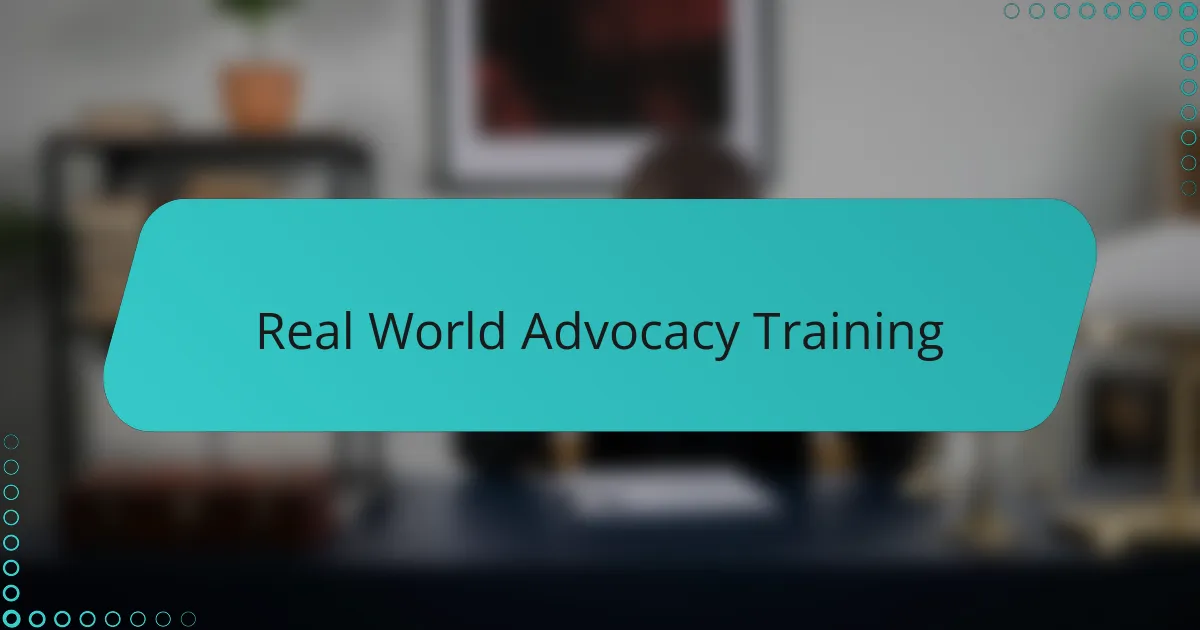
Real World Advocacy Training
Real world advocacy training, in my experience, is where theory meets the unpredictable nature of real cases. I recall a mentee nervously stepping into their first client meeting, unsure how to navigate emotions alongside legal facts. Watching them grow more confident after each interaction reminded me that nothing teaches advocacy like being thrown into the actual flow of human stories.
I often challenge my mentees to draft real pleadings and argue mock cases, believing that hands-on practice reveals gaps no textbook can fill. Have you noticed how preparing for a live scenario sharpens legal reasoning in ways casual study never does? It’s a transformative process that tests both skill and character under pressure.
Beyond skills, real-world training demands resilience and adaptability—qualities I strive to model whenever unexpected twists arise during simulations or community outreach. One unforgettable moment was when a last-minute case detail forced a complete strategy overhaul, teaching us all that flexibility isn’t optional, it’s essential for effective advocacy.
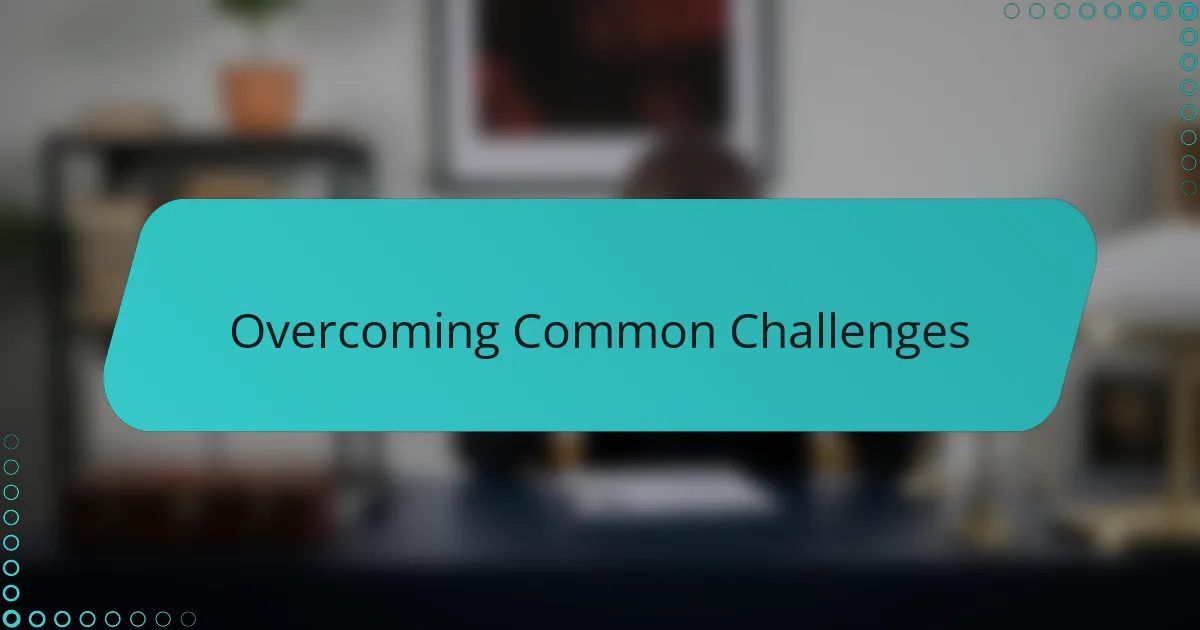
Overcoming Common Challenges
Overcoming common challenges in legal advocacy often means confronting self-doubt head-on. I remember a mentee once questioning whether they had what it takes to speak up confidently in court. Isn’t that fear familiar to so many starting out? Through ongoing encouragement and small wins, I saw them transform hesitation into boldness.
Another hurdle is managing the frustration when cases don’t go as planned. I always share moments from my own career when setbacks felt overwhelming. How do you keep going when the path seems blocked? For me, it was reminding myself—and my mentees—that persistence can change the narrative, even when progress feels slow.
Finally, balancing empathy with objectivity can be tricky for new advocates. I noticed this tension early on and encourage mentees to develop emotional distance without losing compassion. Have you ever struggled to stay present for clients while protecting your own wellbeing? It’s a delicate dance, but one that makes advocacy not just effective, but sustainable.
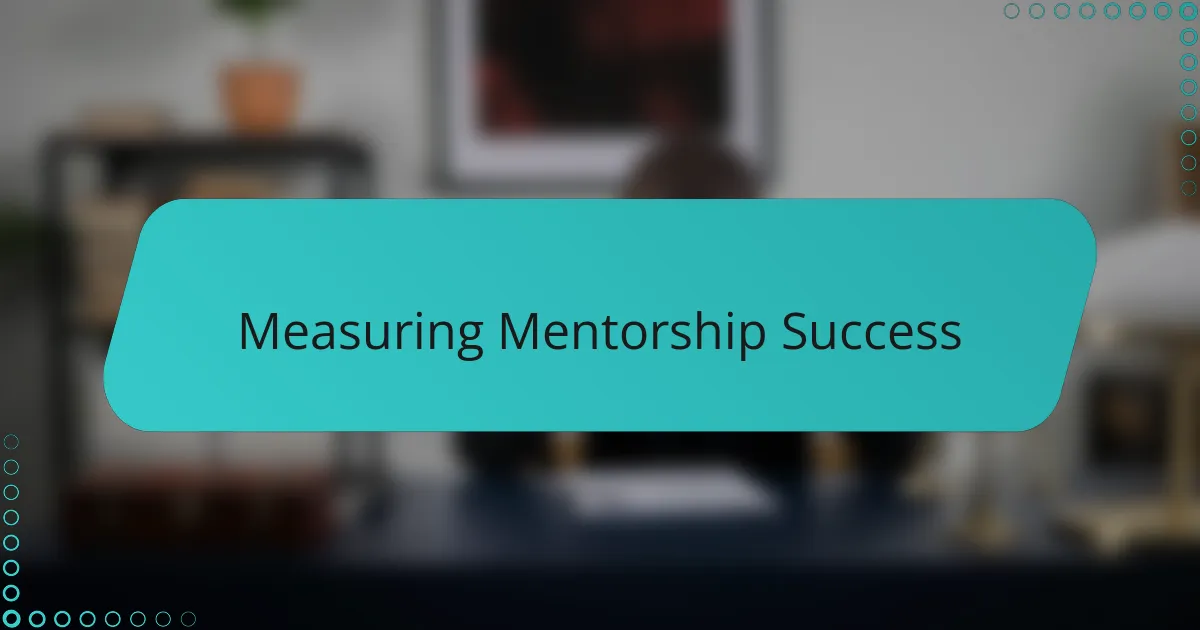
Measuring Mentorship Success
Measuring mentorship success isn’t just about ticking boxes or hitting arbitrary targets; it’s about seeing genuine growth in my mentees’ confidence and skills. I often reflect on moments where a once hesitant mentee speaks up decisively in court or mentors others themselves—those milestones tell me I’ve done my part well. Have you ever had that rewarding feeling when someone you guided suddenly shines in a way that surprises even them?
I also pay close attention to how mentees apply what we discuss in real-world situations, because theory only goes so far. For instance, one mentee once adapted a courtroom approach we practiced together to an unexpected client crisis, showing true internalization of lessons rather than rote repetition. Isn’t it fascinating how practical application can reveal the depth of learning far better than tests or assignments?
Finally, I believe success is tied to sustained progress over time, not just quick wins. Celebrating small, consistent improvements helps keep motivation alive and reveals resilience—the backbone of legal advocacy. I ask myself regularly: are my mentees developing the perseverance they’ll need long after our formal mentorship ends? Watching that persistence unfold, despite inevitable setbacks, confirms the true measure of success.
